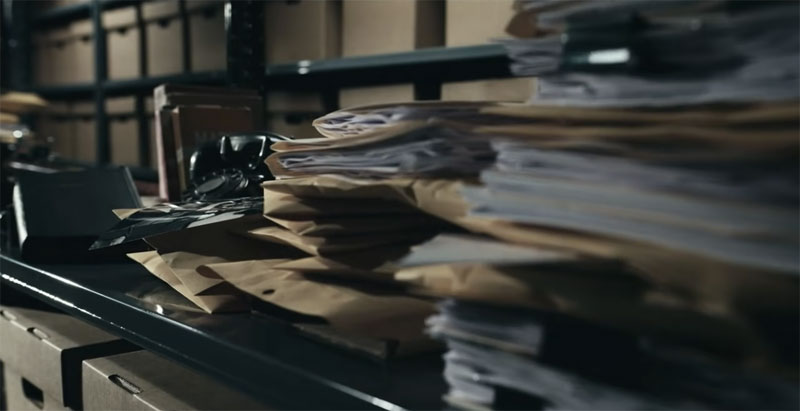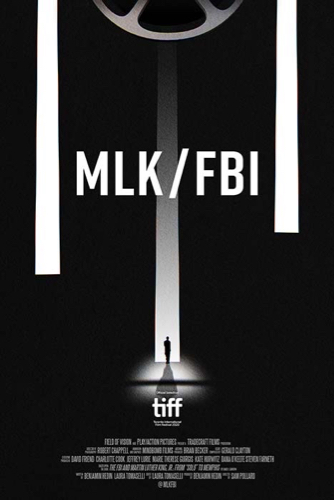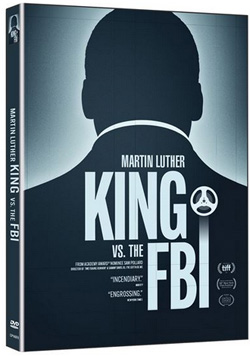MLK/FBI - Martin Luther King vs the FBI
-
Réalisé par Sam Pollard • Écrit par Sam Pollard, David Garrow, Benjamin Hedin, Laura Tomaselli
-
États-Unis • 2020 • 104 minutes • Couleur et Noir & Blanc
- Réalisation :
Sam Pollard - Écriture :
Sam Pollard, David Garrow, Benjamin Hedin, Laura Tomaselli - Image :
Robert Chappell - Montage :
Laura Tomaselli - Animation :
Anton Goddard - Musique originale :
Gerald Clayton - Étalonnage :
Sheina Dao, Seth Ricart - Sound design :
James David Redding III
- Production (personne) :
Benjamin Hedin, Kenneth Alexander Campbell, Phil Pinto - Production (structure) :
Tradecraft Films - Coproduction :
IFC Films - Ayant droit :
Tradecraft Films
- N° ISAN :
non renseigné
Résumé
Le documentaire, fondé sur des documents d'État déclassifiés et inspiré par les travaux de l'historien et lauréat du prix Pulitzer David J. Garrow, montre comment le FBI a lancé une chasse aux sorcières contre King, le soumettant à une surveillance et un harcèlement constants de la part du gouvernement américain.
"MLK/FBI performs the vital task of examining J. Edgar Hoover’s relentless campaign of surveillance and harassment against Martin Luther King, Jr. Today, when King is celebrated across political spectrums as a moral hero, it’s jolting to confront the years when US agents targeted him as a villain. Inspired by the work of historian David Garrow, the film uses recently declassified files to study the FBI’s motives and methods. In the 1950s and ’60s, when Black people started mobilizing to fight racial discrimination, Hoover saw the movement as a communist plot. Rather than support equality, the FBI sought to undermine King through wiretapping and blackmail, in what former FBI director James Comey calls "the darkest part of the bureau’s history". Filmmaker Sam Pollard has been immersed in US racial politics for decades, from his collaborations with Henry Hampton and Spike Lee to his own documentaries. He applies his mastery of archival footage to draw upon eclectic sources, from newsreels to Hollywood secret-agent movies. With visuals rooted in the ’50s and ’60s, he overlays contemporary audio interviews from multiple perspectives, including King’s colleagues Andrew Young and Clarence B. Jones. Pollard doesn’t back away from the murky areas of the story — including the FBI wiretaps alleging King’s non-monogamous relationships with over 40 women, which the FBI attempted to use to humiliate King and break his spirit. The film grapples with how historians should treat such nefarious recordings. King’s life was cut short at age 39. Hoover’s FBI reign lasted 48 years. Today, we see their legacies continue in a new wave of protests and pushback. This film is a crucial way to connect the past to the present."
(Thom Powers)
Mot(s)-clé(s) thématique(s)
Sélections et distinctions
- 2020 • IDFA - International Documentary Festival Amsterdam • Amsterdam (Pays-Bas) • IDFA Competition for Creative Use of Archive
- 2020 • Telluride Film Festival • Berkeley (États-Unis) • Sélection
- 2020 • New York Film Festival • New York (États-Unis) • Sélection
- 2020 • TIFF - Toronto International Film Festival • Toronto (Canada) • TIFF Docs
- 2020 • San Diego Film Festival • San Diego (États-Unis) • Meilleur documentaire
- 2020 • Santa Fe International Film Festival • Santa Fe (États-Unis) • Meilleur long métrage documentaire
Comment avoir accès au film ?
- Sortie en salle
- Édition DVD
-
Accès VOD
- Il n'existe pas d'accès en VOD à notre connaissance
- Distribution
- Aide sur les moyens d'accéder à un film


